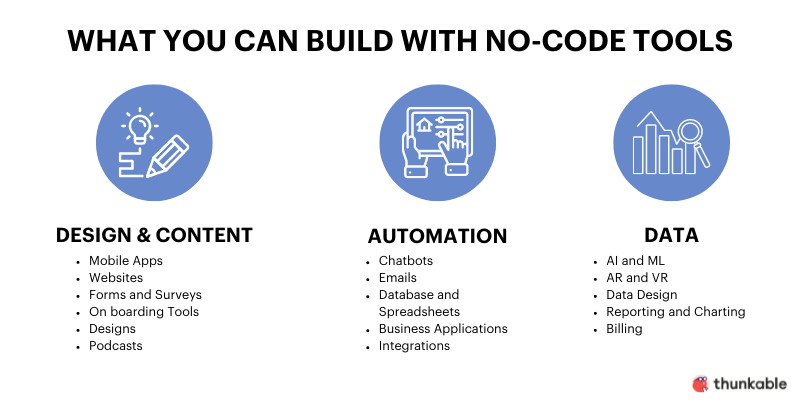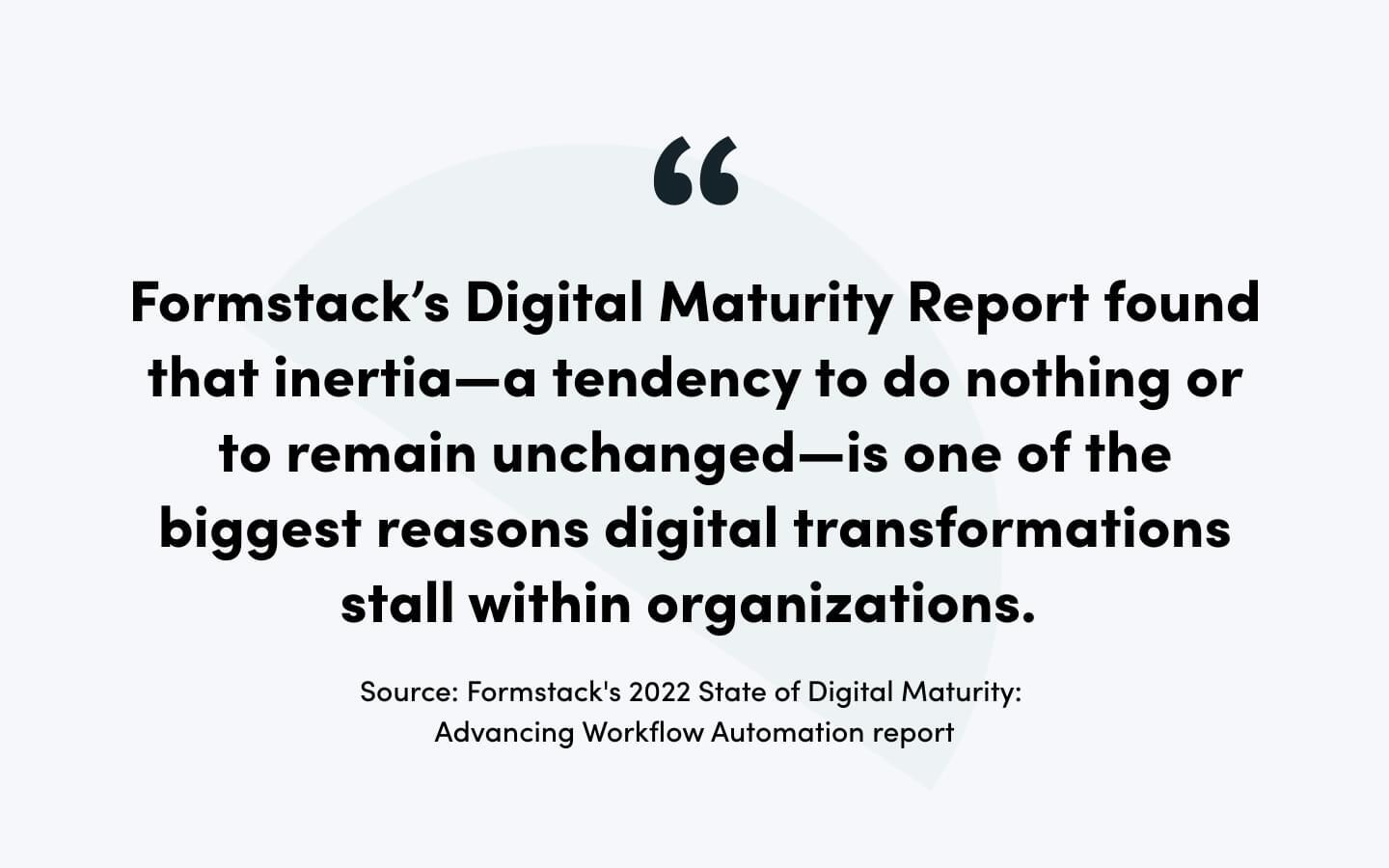What happens when the technology gap within your workforce begins impeding project progress?
What do teams do when they don't have the technical skills to fix a problem?
These are often the questions I come across as the co-founder and CEO of a no-code platform.
The well-known reality is every company needs custom software to survive. Yet, the biggest constraint often spoken about is the lack of software engineers on teams and the inability to build the tools businesses need for efficiency. Teams have tasks that need to be done but lack the necessary skill set to implement them.
What if, suddenly, every team in your organization was a software team?
What if every team had the tools and the power to build anything they needed to optimize their workday? What if every time someone said, "Oh, if only there were an app for that," they could create that app themselves without being restricted by whether or not they have a computer science background?
Imagine the creativity you could unleash and the operational efficiencies that could happen in your organization if your team was enabled with the tools they needed to create the solutions to their problems.
What if there was something easy and accessible to learn so your team could focus on boosting innovation and increasing collaboration instantly? That's where no-code solutions come in.
What is No-Code?
Before diving into how no-code tools can unlock innovation within teams, let's first define no-code.
What No-Code Tools Can Build

No-code platforms provide the ability to build software applications such as websites, emails, databases, and mobile apps without traditional coding methods. These no-code platforms typically have an easy-to-use interface with drag-and-drop capabilities.
What once required the expertise of a software engineer to build mobile apps, or workflow automation, can now be done in just a few steps with tools like Thunkable and Formstack.
The Implications of No-Code Tools in the Workforce
Having been in the no-code space for over a decade, it is clear to me that the transformation within businesses and the innovation from non-technical teams could not be possible without no-code tools. Today, employees don't need to know how to code to build their software solutions.
On a much grander scale, no-code tooling empowers individuals and democratizes the technical skills often held by the elite few. As a result, the no-code movement is revolutionizing how we interact with technology and how teams within businesses operate.
Learn More: The Rise of the No-Code Economy
No-Code Tools in the Workforce
According to Gartner, 70% of new applications built by organizations will use low-code or no-code technologies by 2025. This means most software ideas have not been made yet. By putting no-code tools in their companies, businesses can accelerate their time to market, where the market may be the general public or maybe your team of five people who can benefit from the software solution.
No-code tools are revolutionizing how teams work and collaborate, breaking down traditional barriers between technical and non-technical team members. As a result, anyone is empowered to bring their ideas to life, leading to more diversity and innovation in the workplace.

Why Teams Choose No-Code
No-code tools are transforming how teams approach technical inefficiencies and roadblocks in the workplace.
I hear how companies' lack of software engineers prevents them from advancing. The lack of technical skills is inhibiting progress and innovation.
When speaking with C-level leaders, there are ultimately three paths I see them take:
1) Hire a Software Team
If the company is fiscally able to support this option, then a budget can be allotted to hiring and onboarding a software team. However, this path is often costly and out of reach for small- to medium-sized businesses.
2) Do Nothing
Inertia is always an option. Accepting operations as they are and moving on simply because the business does not have the time or money to find a solution is perfectly acceptable. Understanding realistic business constraints are essential.

3) Invest in No-Code Tools
The last and often most accessible option is adopting no-code tools and empowering your team to solve their problems.
The nice part about no-code tools is the installation is reasonably small, and the barrier to entry is low. Many big software tools you buy require a lot of upfront investment before it's ever going to work for you. With no-code tooling, you can figure out if you need it and then give it a try.
The Benefits of No-Code Tools for Businesses and Teams
Once teams adopt no-code tools, they immediately see the benefits. Let's dive into how teams can accelerate innovation within their teams with no-code tools:
Create Technically Advanced Solutions
No-code tools are designed to be user-friendly and have a much lower learning curve than learning how to code. This means no-code tools can be used by people with all experience levels, from beginners to experts. No longer are teams held back by technological limitations.

Did you know? Formstack is a no-code tool! Formstack's Platform includes all the tools you need to automate workflows with clicks instead of code.
Accelerate Time to Market
Businesses in every sector strive to remain nimble and offer the latest digital technology to satisfy customers. With no-code tools, teams and companies can innovate faster and quickly develop prototypes or minimum viable products (MVPs), utilizing no-code platforms to get their products to market faster.
No-code tools are rapidly developing, and their capabilities will expand over time to allow teams to grow and adapt as the digital landscape evolves.
Boost Project Collaboration
Company projects don't work in silos. Tasks and projects must be completed and often involve several departments with collaborators differing in technical skills. No-code tools can help minimize the skill gaps between team members and bridge communication between collaborators.
One such example I experienced was with a founding team member of an emotional health platform who struggled to bridge the collaboration gap between the product and engineering teams while building a mobile app. Her early mockups failed to communicate the function of each element on the app to the engineering teams. Weeks were wasted on meetings and internal team syncs until she finally could prototype the app with the design features and functionality she needed to demonstrate to the engineering team what needed to be built.

Optimize Internal Operations
No-code platforms can support your team while also optimizing and streamlining processes. With no-code, teams can take a task that takes multiple steps and turn it into one step. As a result, no-code tooling condenses the work and makes operations more efficient.
No-Code's Impact on Intellectual Diversity
By making the development of software solutions more accessible, businesses create opportunities within their organizations for a more diverse range of ideas. You hired the team you have for a reason. They are intelligent, critical thinkers and possess creativity for finding solutions. Their experiences and backgrounds are valuable and shouldn't be limited by the coding knowledge gap.
Upskilling teams with no-code to build their solutions allows innovation in organizations to flourish.
Interested in learning more about the benefits of no-code? Check out these articles:
The Secret to Getting Buy-In for No-Code Tools
No-Code FAQs Everyone Should Know
Low-Code Versus No-Code: What’s the Difference?
Leading the Charge with a No-Code Tech Stack
No-code tooling enables all employees to get hands-on with innovation and creation. However, to successfully implement no-code solutions, selecting the right tools, laying out the groundwork, establishing communication channels, and leaving time for learning are essential. You can download our guide for free for a thorough checklist on how to successfully adopt no-code tools.
Unleash innovation within your workforce by empowering your team to build the necessary solutions.
If you are interested in an all-in-one solution for building apps for Apple and Android devices, as well as mobile and web, then look no further than Thunkable. Thunkable is the most powerful no-code platform for mobile app development. Start building mobile apps for free!
About the Author

Named to Forbes 30 Under 30 and a sought-after thought leader in the no-code space, Arun Saigal is leading the revolution in no-code mobile development. He is the Co-Founder and CEO of Thunkable, the no-code tool that allows anyone to design, develop, and deploy native Android, iOS, and mobile web applications. Through Thunkable, Arun has empowered more than three million people in 184 countries to build more than seven million apps with his company.









.jpeg)

